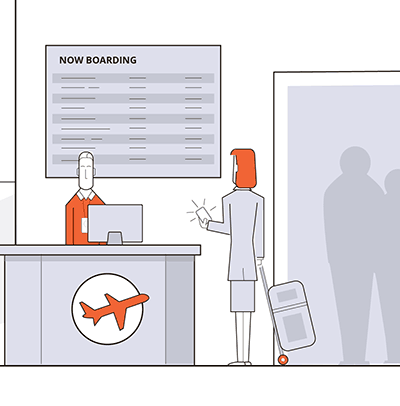Ways to Reduce Employee Travel Expenses
By Mike Raia ![]() | Published June 23, 2022
| Published June 23, 2022
Let’s face it: employee travel expenses can eat away at your budget. With everything from flights and taxis to dinners and drinks, the costs of business trips add up quickly. However, providing your people the opportunity to connect with colleagues or peers—no matter where they’re located—is essential to doing business. Yet you can’t ask your employees to settle for budget travel and still deliver their best efforts. So what are your options?
 Fortunately, there are several effective ways to reduce employee travel expenses:
Fortunately, there are several effective ways to reduce employee travel expenses:
- Use teleconferencing and virtual collaboration tools. Meeting in person to negotiate a deal or work on a project together is not always necessary. Teleconferencing tools like Skype allow multiple people to meet face-to-face without being in the same room—all they need is a laptop or smartphone. At the same time, virtual collaboration tools can be the perfect solution for team members from various locations to work on the same project in real time. You can upload files, use instant messaging, and have group discussions that everyone can follow. In fact, these solutions are not only more affordable than business travel; they can also be more convenient because scheduling an hour or two across time zones and on busy workdays is typically much easier than carving out entire days to travel in person.
- Establish and enforce a strict but reasonable travel reimbursement policy that’s fair to all employees. According to the Society for Human Resource Management, travel costs are nontaxable for the worker and deductible for the employer when they’re ordinary, necessary, and accurately reported. Your travel policy should explain travel costs to employees and provide them with information about your organization's travel reimbursement process. It should specify daily allowances for different types of events and different destinations. It should also allow for differences in employee seniority and provide instructions on how to get approval for additional expenses, such as hosting a large business dinner at an upscale venue. It should also clearly note what add-on fees and luxury expenses don’t qualify for reimbursement and are the employee’s responsibility.
- Use a workflow automation tool to automate the booking process. Making flight and hotel reservations can be time-consuming and complicated, especially when costs must be controlled. Instead of requiring your employees or the HR department to take care of bookings, you can save time and money by automating the booking process. This allows you to set predetermined parameters based on your travel policy, such as a cost cap. It also lets you specify things like preferred airlines and hotels. At the same time, it ensures all bookings are handled in a timely manner, and all transactions are accurately recorded in your bookkeeping system. This eliminates the risk of mistakes, inaccuracies, and irregularities, creating issues that could be both costly and time-consuming. Finally, it frees up your employees to concentrate on their work so they remain productive during the time they’d otherwise spend trying to find the right flight or hotel.

- Use one travel agency for business travel that can’t be automated. Sometimes, you might not want to use an automated process for a specific business trip, for example, if an employee needs special accommodations or when a large delegation is traveling to a conference. For cases like these, selecting one travel agency to handle your company's business travel is advisable instead of asking your employees to book their travel arrangements. You can share your cost parameters and travel policies, preferred airlines, hotel chains, and rental car services with the booking service, and they’ll know how to get you the best prices without compromising your employees' comfort or safety.
- Automate the travel expenses reimbursement process. Employee travel doesn't just involve the costs of transportation, accommodation, and expenses. It also involves the costs of the time and labor your administration department spends on processing those expenses. It can be helpful to use a workflow automation tool that allows employees to upload receipts so they can be processed immediately remotely and the employee can be reimbursed as soon as possible. This has the added benefit of providing transparency in bookkeeping, which minimizes the chances of employees fraudulently trying to claim expenses they didn’t make or that don’t fall within the scope of allowed expenses.
- Book travel as much ahead of time as possible. Last-minute bookings are expensive, period. That’s why you should require all employees to submit a travel request as soon as they know they need to go on a business trip. Getting a reservation on a flight a couple of weeks in advance can save hundreds of dollars or more per round trip, depending on the destination and season.
- Leverage discounts and rewards programs. Most airlines, hotel chains, and rental car companies offer some discounts and rewards programs for businesses that frequently make use of their services. Ensure your HR department keeps track of bonus miles, discounts, and other special offers and uses them to reduce costs when possible.
- Encourage employees to use business apps on their laptops and phones. Many hotel chains offer office facilities with computers, faxes, printers, and more. However, with today’s cloud-based productivity and collaboration tools, it’s easier for employees to store documents in the cloud and share them with others via their phones than it is to print them out and bring them to meetings. While employees might still need to pay for Wi-Fi in their hotel rooms, using business apps will eliminate the costs of using hotel office facilities.
In summary, by using booking technology, business applications, and reimbursement automation, companies can remain agile and practical regarding costs associated with employee travel. And above all, when employees understand that their organization’s business travel policies are designed to be fair, eliminate unnecessary spending, and reduce risk, they’ll be much more likely to plan trips well in advance and only make the necessary expenses when they do need to travel.

Mike Raia
Marketing the world's best workflow automation software and drinking way too much coffee. Connect with me on LinkedIn at https://www.linkedin.com/in/michaelraia/